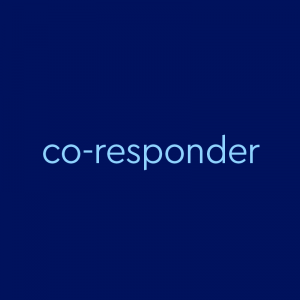Tech & Science dictionary
co-responder
or coresponder [ koh-ri-spon-der ]
What does co-responder mean?
The term co-responder refers to a non-law enforcement professional, such as a mental health worker, who responds alongside a police officer to the scene of an emergency or other situation that would traditionally be responded to solely by law enforcement.
In some cases, co-responder can refer to both (or all) members of such a cooperative unit—with both the police officer and the non-law enforcement professional being considered each other’s co-responder.
The idea behind co-responders is that many situations traditionally dealt with by police can be better handled by mental health professionals and behavioral health specialists, especially in cases involving people experiencing mental health problems or affected by substance abuse. Co-responders are trained to deescalate or help police deescalate situations that may otherwise result in arrest, hospitalization, violence, or self-harm.
The exact role, function, and use of co-responders varies widely. They may be embedded within police departments or may come from other agencies. They may travel to situations together or arrive separately.
The word co-responder is often used in terms related to this kind of system, such as co-responder team, co-responder unit, or co-responder training.
In the US, the use and creation of co-responder programs has increased in recent years, often as a result of pressure to reduce arrests of—and police brutality against—people experiencing mental health problems (especially people of color). Many studies support their effectiveness in these areas.
In the UK, the term co-responder is used in a different way in the context of cooperation between emergency medical personnel and other emergency personnel. In many instances, it refers to firefighters with basic emergency medical training who can treat people before the arrival of medical personnel.
Where does co-responder come from?

In the context of police and emergency personnel, the word responder simply refers to someone who “responds” to a location to deal with a situation that occurred or is occurring there. (It’s most commonly used in the term first responder, which refers to someone whose job is to be the first to respond to the scene of an emergency, especially a police officer, firefighter, or an emergency medical technician.) The prefix co- means “together” or “with”—co-responders respond together with police.
Prior to the 2010s, the term co-responder was often used to specifically refer to programs, policies, or teams involving firefighters working with medical professionals or police officers to handle emergencies. This usage was more common outside the US and is still used this way in the UK.
Congratulations to our Nantwich co-responder team who won the public sector team of the year award @ the UK Heart Safe Awards #UKHeartAwards
— Cheshire Fire and Rescue Service (@CheshireFire) October 3, 2014
In the later 2010s, though, the term co-responder began to be used in the US in the context of cooperative efforts between police and health care professionals.
Our homeless outreach is improving with a new co-responder program that teams mental health professional with patrol officers. #SOTC2016
— Michael B. Hancock (@MayorHancock) July 11, 2016
While many activists and police critics have called for an increase in co-responder programs, some have pushed to eliminate police involvement altogether in some situations (especially mental health crises), instead calling for responses by non-law enforcement professionals alone.
@PhillyMayor @PHLCouncil Send mental health professionals separately, not with cops. We need #TreatmentNotTrauma, fund mobile crisis teams NOT co-responders.
— A. King (@AkingSpeaks) April 29, 2021
Examples of co-responder
Who uses co-responder?
The term co-responder has increased in use in the US as more police departments have instituted such programs.
.@PhillyMayor proposed a $6 million expansion of the pilot 911 triage and co-responder program, as well as a $7.2 million expansion of behavioral health mobile crisis units and a hotline to provide emergency mental health services city-wide.
— Philadelphia DBHIDS (@DBHIDS) April 20, 2021
Los Angeles County Sheriff’s Department credits their mental health co-responder program with preventing 751 use of force incidents and 9 police shootings in a single year. https://t.co/P8gq83uXDI pic.twitter.com/lR0rGzanaF
— Samuel Sinyangwe (@samswey) March 7, 2021
TOMORROW! Remember to tweet @PhillyMayor and let him know that you want funds allocated for ‘co-responders’ shifted entirely to mobile crisis response. Let him know we want caring mental health professionals completely separate from armed police for our loved ones in crisis.
— Amistad Law Project (@AmistadLaw) June 2, 2021
Note
This is not meant to be a formal definition of co-responder like most terms we define on Dictionary.com, but is rather an informal word summary that hopefully touches upon the key aspects of the meaning and usage of co-responder that will help our users expand their word mastery.